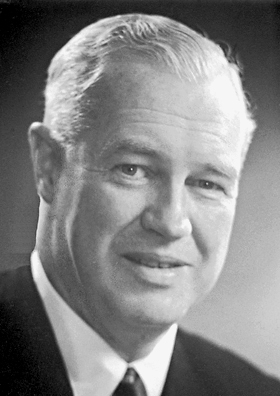Alexander R. Todd
Alexander R. Todd | |
|---|---|
| Born | October 2, 1907 |
| Died | January 10, 1997 |
| Nationality | Scottish |
| Alma mater | University of Glasgow, University of Frankfurt, University of Oxford |
| Known for | Nucleotides and nucleosides research |
| Awards | Nobel Prize in Chemistry (1957) |
| Scientific career | |
| Fields | Biochemistry |
| Institutions | University of Cambridge |
| Doctoral advisor | Robert Robinson |
Alexander Robertus Todd, Baron Todd (October 2, 1907 – January 10, 1997) was a Scottish biochemist whose research on nucleotides and nucleosides earned him the Nobel Prize in Chemistry in 1957.
Early Life and Education[edit | edit source]
Alexander R. Todd was born in Glasgow, Scotland. He attended the University of Glasgow, where he obtained his B.Sc. in 1928. He then pursued further studies at the University of Frankfurt and the University of Oxford, where he completed his Ph.D. under the supervision of Robert Robinson.
Career[edit | edit source]
Todd's early research focused on the structure and synthesis of vitamins and alkaloids. In 1944, he was appointed as a professor of organic chemistry at the University of Cambridge, a position he held until his retirement in 1971. During his tenure at Cambridge, Todd made significant contributions to the understanding of the structure and function of nucleotides and nucleosides, which are the building blocks of nucleic acids such as DNA and RNA.
Research and Discoveries[edit | edit source]
Todd's most notable work involved the chemical synthesis of adenosine triphosphate (ATP) and flavin adenine dinucleotide (FAD), which are essential molecules in cellular metabolism. His research provided critical insights into the mechanisms of biological energy transfer and the role of nucleotides in cellular processes.
Awards and Honors[edit | edit source]
In recognition of his groundbreaking work, Todd was awarded the Nobel Prize in Chemistry in 1957. He was also knighted in 1954 and later elevated to the peerage as Baron Todd of Trumpington in 1962. Todd received numerous other honors and awards throughout his career, including the Copley Medal and the Royal Medal.
Personal Life[edit | edit source]
Todd married Alison Sarah Dale in 1937, and they had three children. He was known for his modesty and dedication to science, often emphasizing the collaborative nature of scientific research.
Legacy[edit | edit source]
Alexander R. Todd's contributions to the field of biochemistry have had a lasting impact on our understanding of genetics and molecular biology. His work laid the foundation for many subsequent discoveries in the field of nucleic acid research.
See Also[edit | edit source]
References[edit | edit source]
Navigation: Wellness - Encyclopedia - Health topics - Disease Index - Drugs - World Directory - Gray's Anatomy - Keto diet - Recipes
Search WikiMD
Ad.Tired of being Overweight? Try W8MD's physician weight loss program.
Semaglutide (Ozempic / Wegovy and Tirzepatide (Mounjaro / Zepbound) available.
Advertise on WikiMD
WikiMD is not a substitute for professional medical advice. See full disclaimer.
Credits:Most images are courtesy of Wikimedia commons, and templates Wikipedia, licensed under CC BY SA or similar.- No local image but image on Wikidata
- 1907 births
- 1997 deaths
- Scottish biochemists
- Nobel laureates in Chemistry
- Alumni of the University of Glasgow
- Alumni of the University of Oxford
- Academics of the University of Cambridge
- Knights Bachelor
- Barons in the Peerage of the United Kingdom
- People from Glasgow
- Members of the Royal Society
- Recipients of the Copley Medal
- Recipients of the Royal Medal
- Medicine-stub
Contributors: Prab R. Tumpati, MD

